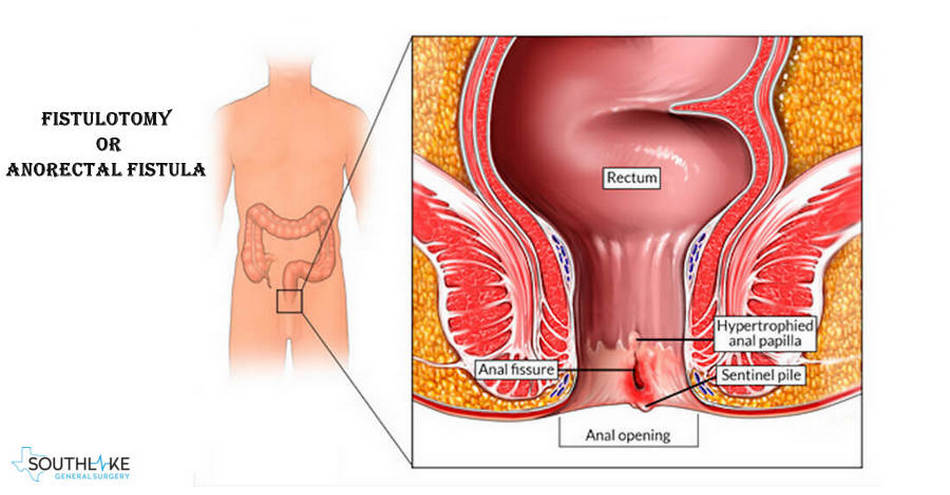A fistulotomy is a surgery used to treat a fistula. A fistula happens when two organs or vessels structure form an anomalous connection. These organs or vessels would somehow or another not be associated. This procedure contrasts from a fistulectomy. During a fistulectomy, the fistula is totally evacuated.
Fistulas might be found in the:
- urinary tract
- anus
- intestines, which is called as enteroenteral fistula
- aorta
- vagina
- skin
Fistulas in the urinary tract occur when a sporadic connection structures from the urinary tract to another organ. These can include:
- vesicovaginal fistula, which structures when there’s a gap between the vagina and the bladder
- urethrovaginal fistula, which is framed when an opening creates between the vagina and urethra
Cause of Anal Fistula
Anal fistulas happen when perianal skin, the skin around the opening of anus, forms an irregular connection with the outside of the anal canal. Anal fistulas might include:
- anorectal fistula, which frames between anal chanal and the skin encompassing anal opening
- rectovaginal fistula, which happens when a gap creates between the vagina and the rectum
- colovaginal fistula, when an connection frames between the vagina and the colon
What to expect during a fistulotomy?
A fistulotomy ( Fistula Surgery) is an outpatient system, which means it likely won’t require a short-term hospital stay, performed to open a fistula. This procedure usually takes about 60 minutes. You’ll likewise need to get ready for extra time whenever the surgery is scheduled.
If fistula is small and shallow, surgeon might have the option schedule the procedure in their office with local anesthesia. If fistula is large and slightly complex, you may need to visit our hospital and have general anesthetic.
During the fistulotomy, our surgeon will make an incision in your body to open up the abnormal association between the two organs. This might cause a few complications following the surgery, including:
- incontinence of bowel, if the anas or rectum is involved
- bleeding at the site
- abscess or repeat of the fistula
Anorectal Fistula surgery recovery
Doctor will send you home with directions to keep the wound clean and stuffed with gauze. Pressing it with bandage will help keep your skin from mending over the wound, which could make another fistula to develop. The wound needs to heal from the back to front. Your primary care physician will brief how to care about your wound, yet don’t hesitate to pose any inquiries. Good home care and rest will improve your recuperation.
You’ll need to rest for the initial 24 hours after the surgery, however you should continue your regular diet after the surgery. Ask family or companions to get you out around the house, and plan to take at least a day off from work. You should avoid intense physical activities, including exercise and heavy weight lifting, for in any event five to seven days. Doctor may prescribe waiting longer to continue all of your daily task. Always follow your primary care physician’s suggestions.
You may experience some cramping and queasiness frequently following the procedure. You may likewise encounter constipation as a reaction of your pain medications. If any of these symptoms are experienced, consult with your doctor about using a stool softner, which can assist you with normal bowel function.
It might take 3-12 weeks to completely recover from a fistulotomy.
Is it only procedure to treat a fistula?
When you schedule your visit with doctor before the surgery, they’ll examine your symptoms and conduct a physical test. In case you’re encountering serious pain and waste close to the region of the fistula, it might be an indication that you have an infection.
Doctor may utilize an extension called a sigmoidoscope for anal-rectal fistulas, to do an internal assessment of the fistula. This will assist doctor to determine the affected area and reason for the fistula. If doctor finds that your fistula is brought about by Crohn’s disease, surgery may not be applicable. You might have the option to treat the fistula with medicine.
How to Diagnose the problem?
Doctor may likewise use any of the accompanying diagnostic procedure to help decide a course of treatment:
- Endoscopic ultrasound: This ultrasound makes pictures of pelvic floor and sphincter muscles to assist doctor to recognize the area of the fistula.
- Fistulography: Under this procedure, a contrast solution is infused into the fistula and afterward an X-ray is taken of the area.
- Anoscopy: Doctor might go for this procedure to view your anal canal.
- MRI: This may assist doctor to find the fistula if it’s hard to access during a physical test.
- Fistula probe: Doctor may place this instrument into the fistula.
- CT scan: This method may allow doctor to examine the progression of contrast dye between two region of your body that shouldn’t be associated.
For more information on Anal Fistula problem diagnose, treatment and surgery. Please contact our healthcare expert today and book an appointment at: https://www.southlakegeneralsurgery.com/make-an-appointment/

